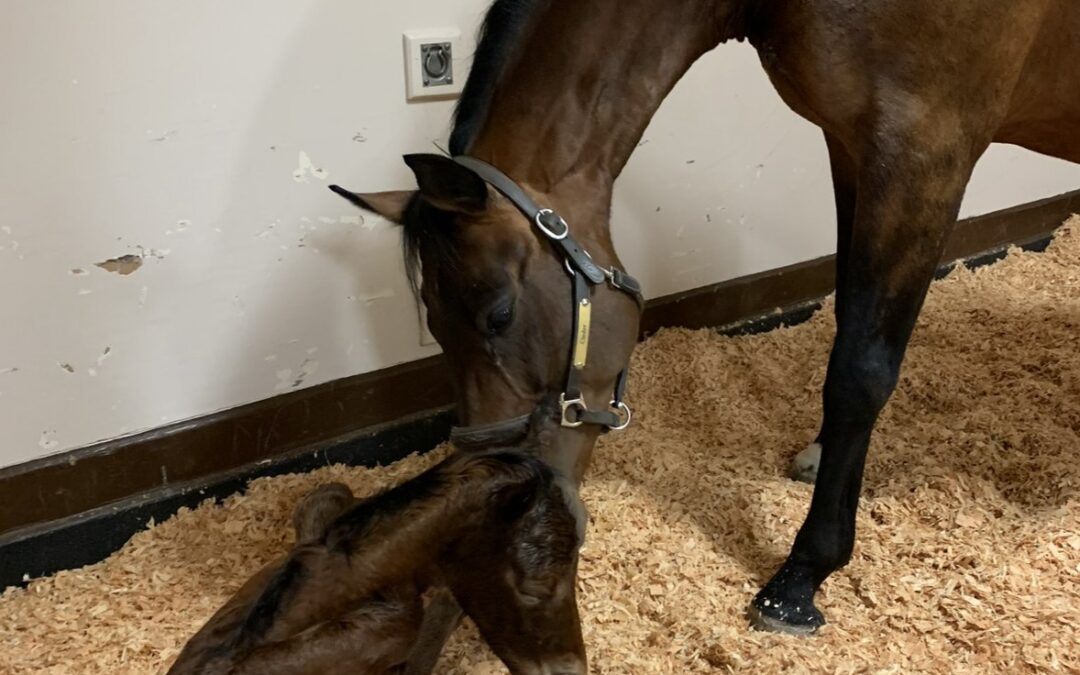Make Sure She’s Producing Adequate Colostrum and Milk
If the mare is not producing milk, the foal will need supplemental milk for nutrition and a plasma transfusion to provide adequate immunity to prevent a blood infection (sepsis). The mare might need additional feed as well as hormonal supplementation (i.e., oxytocin and domperidone) to stimulate or augment her milk production. Make sure her milk appears normal (not chunky or discolored). Prior to foaling, her bag should fill with colostrum, which is a thick, honey-colored substance. After the first 12 hours of nursing, regular milk replaces the colostrum. Check the mare’s udder for any heat or pain indicating potential mastitis (mammary gland infection), which requires special udder treatment and antibiotic administration by your veterinarian.
Assure She Passes Her Placenta Within 2 Hours
Most mares will pass their placenta within an hour after birth. After two hours, the mare’s placenta is considered retained, which is a medical emergency requiring veterinary intervention. As the mare approaches four to six hours of placental retention, she is at risk of becoming extremely ill and even dying. The retained placenta allows bacteria to overgrow in the uterus and release deadly toxins. A retained placenta can have several adverse effects on the mare: Her immune system can be severely compromised, she can founder, and she can develop endometritis that can compromise her reproductive future. Contact a veterinarian anytime your mare retains her placenta in the uterus longer than two hours. The veterinarian will likely recommend she receive anti-inflammatories, a uterine lavage, and possibly antibiotics.
Once the placenta passes, pick it up immediately so the mare cannot tear it up or eat it. Save the placenta in a bucket of ice water for your veterinarian to inspect when he or she performs new foal and post-foaling mare exams within 24 hours of foaling. Any tears in either horn tip of the F-shaped placenta should be checked by your veterinarian. This often indicates the mare has retained a small portion of the placenta. A small bit of retained placenta requires just as aggressive of medical care as a complete placental retention and is often more difficult to clear.
Inspect the Mare’s Vulva for Excessive Bleeding, Discharge, Tears, or Swelling
These injuries might be the tip of the iceberg. Your veterinarian should examine the mare’s vulva and vagina for serious tears into the abdomen, rectum, and retroperitoneal space. These can be life-threatening and have a significant impact on the mare’s future fertility.
Paty Attention to Her Attitude
The mare should be bright and alert. If she is depressed, weak, colicky, lethargic, or laying down excessively, call your veterinarian. She might just be experiencing mild post-foaling colic from the uterus contracting; however, other insidious and life-threatening diseases could be brewing, such as uterine artery rupture, partial placental retention, or uterine tear. Uterine artery rupture and tears require hospitalization and possibly surgery and intensive care to save the mare.
Track Her Temperature
Check that the mare’s temperature is normal for the first three days post-foaling. If a placental retention or mastitis has been missed, the mare will often spike a fever of >101 F within the first three days after foaling, often before she looks outwardly ill. Early is always the best time to intervene.
Make Sure She’s Eating and Drinking
Remember the mare must eat and drink well to produce adequate milk for the foal and support her basic daily needs. Going off-feed or not drinking well could indicate anything from a common mild post-foaling colic to a more serious underlying disease — such as gastric ulcers, chronic renal disease, or uterine compromise — manifesting with the stress of lactation.
Monitor Her Manure Production
The mare should continue to pass normal manure following foaling. However, if she experienced any trauma during foaling (i.e, if the foal kicked/bruised the mare’s GI tract), manure might not pass normally, predisposing the mare to a potentially fatal cecal impaction. Please notify a veterinarian if the mare is not passing normal manure within 12 to 24 hours of foaling.
These are basic guidelines for things to monitor post-foaling to ensure a healthy mare and foal. Feel free to call us with any foaling questions or concerns. Good luck, and have a healthy and happy foaling season!
